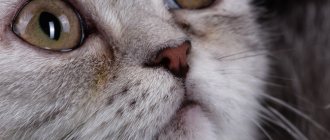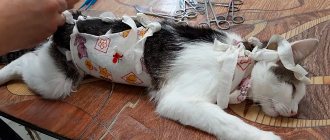Cats have been domesticated for 10,000 years. Due to their shorter period of domestication, cats exhibit weaker reactions when interacting with people. Their aloof behavior means that any bond the cat has with their owners is often called into question. People often wonder if cats will miss their owners when they are taken to a shelter.
Fostered cats may miss their owners. Cats have good long-term memory and can recognize their owner even after years of separation. However, it is likely that new living conditions cause stress in cats. Any depression or aggression may be caused by a change of home, and not by an unbreakable attachment to the previous owner.
Cats' body language is very subtle and difficult to discern. Therefore, even if cats miss their owners, the signs of this are not obvious. Additionally, there are various studies on whether cats become attached to their owners, but many of them contradict each other. However, there is nothing to indicate that all cats are indifferent to their home and the people in it. To know if your cat has this emotional range, you need to consider a specific cat.
Do cats miss their former owners?
Cats are not as enthusiastic about human company as dogs (which have been domesticated for much longer than cats). Because of this, many consider them cold and careless. Their withdrawn nature makes people question whether the cat will miss them if it is rehomed.
The truth is that cats' psychological attachment to humans is difficult to measure. Research on this issue constantly contradicts each other. According to the journal Current Biology, cats develop different attachment styles, just like dogs and humans. Namely, “secure attachment” and “insecure attachment.”
The study involved 108 cats of different ages. The results revealed that 64% of cats experienced secure attachment to their owners. In other words, they trusted their master and had a strong bond with him. However, another study conducted by the University of Lincoln directly contradicted the claims of the previous study.
It states that cats do not show signs of secure attachment to their owners. Instead, it is claimed that cats vocalize more in the presence of their owner, which coincides with the results of a study from the Swedish University of Agricultural Sciences. A third study claims that cats interact more with their owners after a period of separation. This suggests that cats understand that their owner has left them and misses them.
Will the cat miss its owner?
These studies are very interesting, but they all have common problems. Namely:
- Subjects were observed only for a short period of time
- do not take into account the inconsistency of cat behavior.
Anyone who has a cat knows that they don't interact with every person the same way. For example, dogs are constant in their affection unless they are upset. The cause of mood changes is usually easy to determine since dogs are very expressive. On the other hand, cats may love to sleep on your bed and then suddenly change their sleeping space for the bathroom, seemingly for no reason.
Cats are also more sophisticated in their behavior. Therefore, it can be more difficult to determine what they are feeling. Combined with the fact that cats are so fickle, it can seem like they don't care about us at all. However, cats like to feel safe and taken care of by us. There is no convincing evidence that cats do not feel attached to a person with whom they associate this security.
Based on what we understand about animal cognition, cats want to be around people they know will benefit them. Animals associate their owners with positive things:
- Food
- Shelter
- Water
- attachment
This creates stability, and cats are smart enough to realize that this is good for their survival. They quickly become attached to these good things, and any attachment to the owner follows.
Boundaries and restrictions
So simply, in just a few words, Professor Leyhausen proves that cats really love their owners, and do not just take advantage of the benefits that we provide them. It is clear why the owner’s cat licks him - she accepts him into the family, takes care of his non-existent fur coat, and shows that she is supportive. This is typical cat behavior within a “mother” and “kittens” family, where the role of kittens and mother can also be played by adult pets who are not related, but play according to the generally accepted pattern.
But, no cat will allow another to get its paws into its mouth and ears. And we can not only wash out the eyes, put a cotton swab in the ear, brush the teeth and even bathe the cat. If the pet really loves the owner and trusts him, she calmly hangs in his arms, for example, in a showroom full of strangers, sounds, smells, and most importantly, full of strange cats, which is generally incomprehensible to the mind. Isn't this evidence of sincere love? After all, a cat doesn’t know how to lie, doesn’t know how to obey - she either loves you, or you’re not trying hard enough.
Do cats get depressed when they return to their home?
When the person they associate with survival and stability leaves, cats notice. They also get very upset. According to the American Veterinary Medical Association, cats become ill when they experience change.
In the study, one observer cared for the cats for 77 weeks. Cats went through many changes, one of which included changing owners. The stress they experienced (as the stability they once knew disappeared) indicates that cats truly miss their owners. This happens because they lose what is familiar to them.
However, it doesn't take a scientific study to know that cats miss their owners. There are many videos showing what cats do when their owners are away during the day.
For example, after a long separation, some cats meow throughout the house. Cats do not talk to each other and only meow in the presence of people. It is safe to assume that they are calling out to their masters. Cats also show obvious signs of affection towards their owners, such as:
- Purr
- high tail with a curved end
- Rubbing his face on you
In situations where a cat's owner dies but the cat is not adopted, the cat will often show signs of depression, such as:
- Lethargy
- Lack of vocalization
- reluctance to eat
These signs are much more obvious when the cat returns home. After all, a change in environment causes a lot of stress.
Other signs of attention
The cat does not like to be stared at.
She tolerates it when her owner watches. It's like kissing him. This kind of romance makes up the trust factor of cat love. Also, cats prefer to occupy only comfortable places in the house. A corner in which they can safely sit or lie down suits them. Many of them enjoy people-watching, sitting on the back of the sofa, watching television programs and carefully resting on their laps when the owner is trying to read a book. They don't need other places, they need love and protection
Do cats remember their previous owners?
Cats have excellent long-term memory. This is a vital part of their survival. Thanks to their good memory, cats can remember where to find food, water and shelter. It also helps them remember how to avoid danger.
In the question “Do domestic cats recognize their owners?” all the evidence points to yes. However, the theories are not based on how cats interact with their previous owners after being reunited. Instead, they are based on how good the cat's visual memory is. Remember that cats are very sensitive when it comes to expressing affection. Even if a cat remembered its owner, it would be difficult to determine unless the cat was overly affectionate by nature.
According to the University of British Columbia, cats have excellent visual memory. This is explained by the fact that when walking, cats plan 2-3 steps ahead. They can step over obstacles without error even in the absence of visual perception. The study suggests that cats rely on visual memory to step over obstacles even when they aren't looking at them.
When it comes to short-term memory, other studies have shown that cats only retain it for a little over 24 hours. However, with enough repetition, certain people, actions and objects become part of their long-term memory. Therefore, we can say with confidence that cats really remember their previous owners.
Will the cat remember me in a year?
If you don't see your cat for a long time, you may worry that she won't remember you. However, rest assured: cats have good long-term memory and can remember something for up to 10 years.
Of course, it all depends on how old the cat is. As cats age, they lose brain cells and this affects their memory. A cat that has aged significantly while away from you will have great difficulty recognizing you. She may even be hostile towards you because she sees you as an untrustworthy stranger.
Powerful encounters, both positive and negative, leave a lasting impression on cats. If you take good care of them for more than a few months, they will associate you with good things. The longer you care for them, the stronger these associations become.
Animals are looking for people everywhere
The Phoenix Zoo has started hosting lunches with elephants and orangutans to keep them entertained. Many birds, accustomed to people, also now need their frequent visits. The primates, not understanding where the people had gone, went in search of them. The animals seem to be asking what happened to everyone.
Zoo director Leo Osterwegel said the animals now look at him with longing: “They are used to visitors. The elephants and gorillas especially seem to miss people, they really enjoy seeing people." Linda Hardwick, director of communications, said: “We have noticed that some of our more social animals are becoming very bored. The primates especially noticed that our guests were gone, and they went looking for them.”
I made a cozy house for a cat: the pet is happier than ever
New tiles for the bathroom were unaffordable: the woman painted everything and made the right decision
Paustovsky wrote his story in an hour: about Captain Scott and the wind of distant countries
We recommend viewing
Do cats mate with their siblings? Black cats Can a cat's paw pads change color?
In some cases, a cat that misses you will still try to avoid you. This leads many owners to believe that the cat has completely forgotten them within 14 days of returning to the house.
On the contrary, there is a theory that the cat remembers you, it just has a different attachment style. If your cat has an insecure attachment to you, she may feel like her stability is threatened simply because you are gone. Even if your cat understands that you have returned, this stress may cause her to avoid you. She may also exhibit destructive behavior such as scratching and biting.
Different cats react differently to what brings them joy. If your cat exhibits one of the above behaviors one day, don't be surprised if she doesn't do so the next day.
Could it be because your cat is angry with you or simply didn't miss you as much as usual? In fact, this hot and cold attitude is not unique to humans. Cats are so fickle that one day they will meow enthusiastically and follow you around as you pour food into their plate. And the next day they may be hesitant to go to their bowl.
How to treat fear of separation?
About a quarter of an hour before the owner leaves the house, it is advisable for him to ignore the cat. It is advisable to do the same within the same period after returning home. Alternatively, you can distract your pet with a toy. For example, you can take a cylinder from a toilet paper roll and, having sealed its ends, make holes on the sides, filling it with various treats that would fall out of it when the pet rolls the cylinder on the floor. On sale you can also find ready-made toys arranged in a similar way. Another way to distract your pet during this time would be to hide treats in different corners of the house. Fifteen minutes before leaving, you can immediately give your cat all the toys that she loves most, and upon returning home, they should all be hidden.
It is also worth trying to make the world around you as interesting as possible for your cat. To do this, the cat should build a secluded and comfortable place from which it could watch street life through the window. It’s even better to build a place opposite the bird feeder, where the cat will probably watch “In the World of Animals” for a long time. Scratching posts and climbing frames will also add zest to life and distract the cat from obsessive fears. Having a low volume on the TV or radio may be helpful. Some cats are very partial to programs about various animals, especially if they are cats or their potential prey. Others tolerate loneliness better if they have another animal with them. Although this, of course, depends on the specific feline representative. In some cases, you can resort to medication for a while. As a rule, veterinarians prescribe Clomicalm, Buspar or Prozac in such cases. Otherwise, cat owners can only rely on their intuition, a creative approach to solving the problem and future research in this area.
Source
Should you return your cat to your home?
Some situations lead us to the point where we are faced with the painful need to return our beloved cat. However, if there is a chance to avoid the cat returning to the house, you should take it.
Cats have feelings and form bonds with their owners. The feeling of security they feel when someone provides for all their needs makes them happy and maintains their emotional stability. This is true even if they don't show it.
Of course, when you rehome a cat, you change its environment. Here she does not understand that all her needs will still be met. Since the cat is no longer in its familiar space, it does not yet associate new owners with positive encounters. Instead, the cat thinks that it will now be difficult for her to find food and that her new owners may harm her.
Changes in ownership and environment cause cats to believe their survival is at risk. The resulting stress can lead to possible injury and illness. The good news is that cats are highly adaptable.
Of course, they may experience a spike in stress after returning to the house. However, over time, they will be able to adapt to the new environment and remain happy. Young cats are much better at adapting to new environments, while older cats have difficulty adapting to change. If you have an older cat, returning her indoors should be a last resort, otherwise the cat may suffer from stress for a long time.
CAT TOYS
Manufacturers offer a variety of balls, mice, spring teasers, and mazes.
The buyer should pay attention to products designed for pets to play independently. They have an attractive appearance and a large margin of safety
You can make some fun toys yourself. For example, sew a round bag from an old bright sock and fill it with dried peas. Or knit a small mouse from threads. If you use pieces of natural fur for decoration, your pet will simply be delighted.
The new toy should be made available to the domestic predator for a while - let him try it out. After this, the item should be hidden and taken out only before leaving for work.
Otherwise, the cat will very quickly get tired of the accessory, and she will stop paying attention to it.
Cat houses deserve special attention, as they not only serve as a playground, but also provide comfortable conditions for relaxation. Designs should be chosen based on the size and character of the pet.
Consequences of returning a cat to a new place of residence
Changing ownership has a profound effect on a cat. This is especially true for those cats that have lived with their owner for a long time. Unusual behavior that occurs after a cat is returned to the house is quite expected. How long this behavior will last, of course, depends on the cat itself and on how the change between the old and new environment took place. After returning to the house, the cat may exhibit:
- excessive grooming
- No grooming
- Lack of appetite
- Binge eating
- Lethargy
- Reluctance to communicate
- Changes in vocalization tone
- Vocalization more
- Less vocalization
- Increased aggressiveness
- Increased nervousness
- Hide and seek
- clinging
- Excessive sleep
- Reluctance to use the toilet
- Excessive scratching
All these changes are caused by the stress and depression that cats experience after returning to their homeland. However, it is the physical changes that are most alarming. Cats may experience physical distress after change, whether due to:
- change of owner
- change of daily routine
- Lack of communication with the owner
- a change of scenery
Stress weakens the immune system and puts cats at risk for infections. A weak immune system can be combined with:
- Lack of proper nutrition
- Lack of exercise
- Excessive grooming (which can cause skin wounds).
Thus, short-term stress can cause cats to develop long-term health problems.
HYGIENE PRODUCTS
Sometimes an animal may not only feel sad when alone, but also experience irritation due to a dirty tray. Some cats flatly refuse to relieve themselves until the owner cleans the latrine. Sometimes they have to endure for several hours at a time.
In this case, be sure to purchase an additional tray. Let it take up a little more space, but the pet will feel comfortable.
For a cat that has to sit at home alone for a long time, you can buy a special interactive scratcher. This accessory is created to satisfy the animal’s natural needs for tactile sensations. Products may have massage inserts for the face and neck, a rubber tip for training teeth and gums, as well as a special acupuncture mat.
The pleasant touch of the massage attachments has a calming and relaxing effect. Many owners who bought such scratchers noted an improvement in their pet’s behavior and well-being within a few days.
Don’t forget about the scratching post, which is a vertical bar or column. The accessory should be placed in places where a domestic predator is used to sharpening its claws, for example, in front of the leg of a sofa or chair. A daily cat ritual also promotes relaxation and stress relief.
Does a cat remember its owner in his absence?
A cat associates a good and kind owner with safety, comfort, coziness, care and nutrition. But it happens that pets choose only one family member as their favorite, become attached to him, find affection and love in him, despite the fact that other relatives are engaged in feeding and cleaning the tray. Therefore, if a cat’s pet is absent from home for a long time, a week or a month, the cat is waiting for him, will definitely remember and recognize him, even if she does not look sad. In special cases, cats do not show their emotions when they meet, because they are offended and want to punish for “abandoning”. Other representatives of domestic cats express intense joy, showing with all their appearance how missed they are. Therefore, cats remember and recognize their owner, even if they are left alone for a while.











